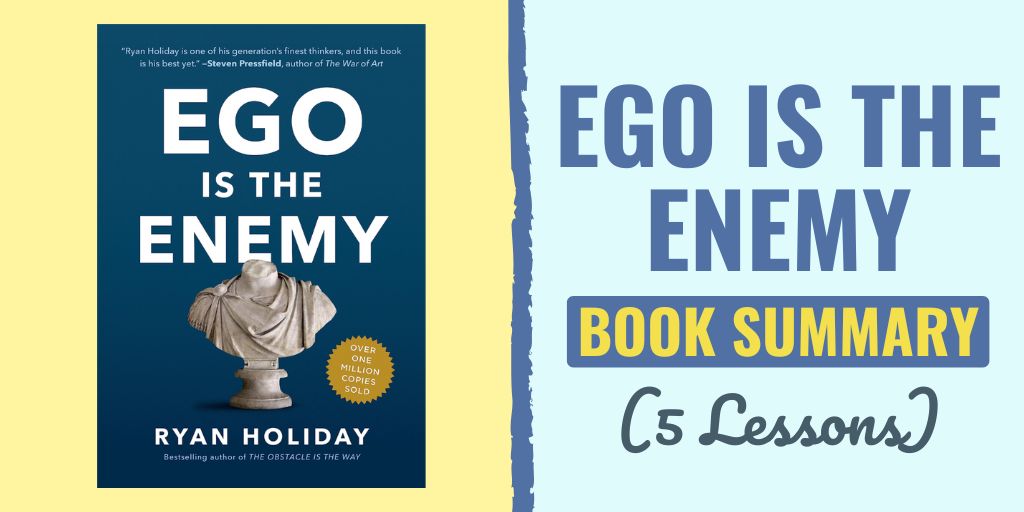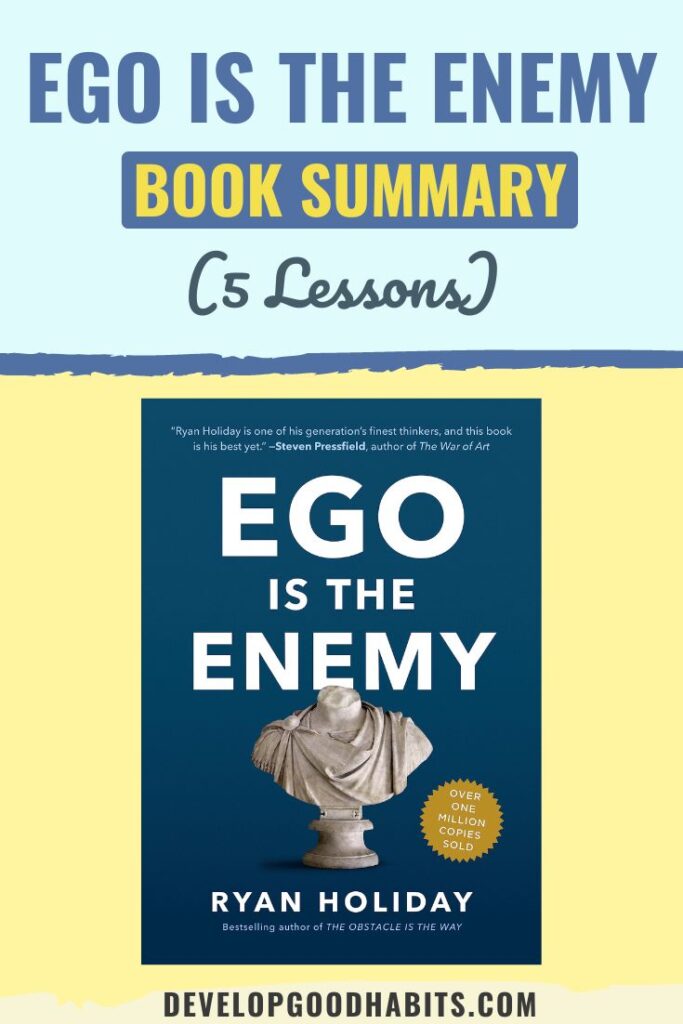There might be affiliate links on this page, which means we get a small commission of anything you buy. As an Amazon Associate we earn from qualifying purchases. Please do your own research before making any online purchase.
Did you know that your mindset can make or break your long-term success in life?
Specifically, your ego can push you toward success, but if it's left unchecked, your ego can be the architect of your downfall.
Ryan Holiday’s “Ego is the Enemy” reveals how unchecked ego can lead to failure and misery, through a mix of history, philosophy, and real-life examples.
This best-selling book delves deep into the concept of ego, illustrating its role as an obstacle to personal and professional growth.
Throughout Ego is the Enemy, Holiday emphasizes the importance of humility, adaptability, and self-awareness in overcoming the traps set by ego.
But is this book worth checking out?
In this post, we’ll provide a brief summary of this book and then highlight 5 lessons you can learn from Ego is the Enemy.
Now, if you’d like to check out the book, you can read it on your Kindle, get a print copy, or listen to the audiobook.
Or, if you prefer to watch instead of read, here's the video version of this article:
Lesson #1: Recognizing the Ego in Yourself
There are three major things you do when your Ego is becoming too strong:
#1: Overconfidence
Sometimes, you may find yourself feeling overly confident in your abilities and achievements. It's essential to be aware of this mindset, as it can lead to arrogance and complacency.
Ensure that you remain humble by acknowledging your limitations and the continuous need for improvement.
This isn’t just about being “nice and spiritual” this is about becoming more effective. Masters of martial arts become masters not because they have big egos but because they realize through time and practice that there’s always more to learn.
Bruce Lee encapsulates this well in his famous quote “I fear the man who has practiced one kick 10,000 times.”
This martial arts analogy can apply to any part of life.
Let’s look at the second ego-driven behavior:
#2. Validation Seeking
Your ego can also manifest in your constant need for validation from others.
You might obsess over others' opinions, seeking praise and admiration to feel complete. It is crucial to develop self-validation and remind yourself that your worth is not dependent on external recognition.
When you start to focus on improving yourself for your benefit rather than for others, you'll find that you're less reliant on their approval.
This leads us to the third ego-driven behavior:
#3. Comparing Yourself to Others
Another trait of ego is the tendency to compare yourself to others. This can be damaging as it leads to envy, competition, and even feelings of inferiority.
Remind yourself that everyone has different strengths and weaknesses, and it's okay not to excel at everything.
Focus on your progress and growth, rather than trying to outperform others. Remember, success is not a finite resource – there is room for everyone to succeed in their unique way.
These three will set you on the path to poor progress and less fulfillment. By staying mindful of these three aspects of ego, you can work on minimizing its influence on your life.
Now, let’s look at:
Lesson #2: Be Humble
Our entertainment and social attitudes all encourage an unhealthy development of the Ego, whether Instagram influencers or beauty pageants and reality TV shows, these all scream “confidence, confidence, and confidence.”
The truth is, confidence doesn’t make people successful, competence does.
Did you successfully commute or drive to work with confidence or competence?
Would you rather have a highly competent neurosurgeon or an overly confident one?
Our modern society views humility as a weakness, but the reality is that humility is the key to improving and progressing.
Holiday shows us how with the following concepts:
Humility lets us learn from mistakes
Failure is the greatest teacher – but if you’re afraid of failing and making mistakes you will simply never know what you’re fully capable of.
When you make a mistake, don't let your ego get in the way.
Instead:
By humbly accepting fault and learning from your mistakes, you'll be less likely to repeat them and more likely to grow as a person.
Humility leads to a growth mindset
With humility, you're better equipped to adopt a growth mindset. This is key for personal development and can be achieved by:
Now, to learn more, watch this video that explores the differences between a growth and fixed mindset.
This leads us to:
Lesson #3: Practice Self-Awareness by Embracing Feedback
To conquer your ego, it's essential to practice self-awareness. Start by recognizing your thoughts, emotions, and reactions.
Becoming aware of your internal responses to situations enables you to identify and address any ego-driven behaviors.
Regularly reflect on your thoughts and emotions to better understand the underlying motives.
The Ego can work very deceptively, people find creative ways to brag about their accomplishments and subtly ask for validation from others.
When you’re on a roll and seem to be conquering obstacle after obstacle you can forget about the things that you’re not in control of that help you to succeed. This is the trap that your Ego sets for you that most people fall into.
To grow and improve, you need to embrace feedback. This may be uncomfortable at times, but honest and open communication is essential for personal development.
Remember, feedback is an opportunity to learn and progress, not a form of criticism.
Actively seek out feedback from people you trust and ensure you're genuinely listening and absorbing what they have to say. It's essential to leave your ego at the door and remain open-minded.
Lesson #4: Stay Curious
Cultivating curiosity is key to maintaining an open, ego-free mindset. When you stay curious, you continually seek new knowledge and experiences, reminding yourself that you don't know everything.
Make a habit of asking questions, exploring new ideas, and challenging your existing beliefs.
This constant state of exploration allows you to approach situations with humility and a willingness to learn, ultimately keeping your ego in check.
When you stay curious you embark on a learning journey that will last a lifetime, and this serves to only make you more and more effective.
However, it’s important to remember that while humanity as a whole has made a lot of progress we know the smallest fraction of what’s out there.
Lesson #5: Learn from History
History has countless examples that show the danger of the Ego.
For example, around the late dark ages and early medieval periods, it was firmly believed that humanity had made all the technological advances that they could have made.
However, a medieval farmer would not recognize most of the tools and technology a modern farmer takes for granted today.
Alexander the Great's insatiable need for conquest and power led to his untimely death.
Howard Hughes' unchecked ego resulted in his isolation and eventual decline in health.
And Napoleon Bonaparte's ego pushed him into making disastrous military decisions.
You can see how the ego can be a destructive force in one's life, leading to their downfall even when they were once at the height of power and success.
There are also real-life success stories about people putting aside their egos and achieving incredible things:
Consider these examples as you navigate your own life, and remember that the ability to control your ego can lead to a more fulfilling and successful journey.
Final Thoughts on Ryan Holiday’s “Ego is the Enemy”
In Ego is the Enemy, Ryan Holiday presents valuable insights and lessons that can help you overcome the internal obstacles that stem from your ego.
By grasping these concepts, you can lead a more fulfilling, productive, and successful life.
Now, as a reminder, if you’d like to check out the book, you can read it on your Kindle, get a print copy, or listen to the audiobook.
And if you want to check out another book summary, then watch our video about the 5 lessons you can learn from Atomic Habits by James Clear.
And if you're looking for more articles on book recommendations and book reviews, be sure to check out these blog posts:



